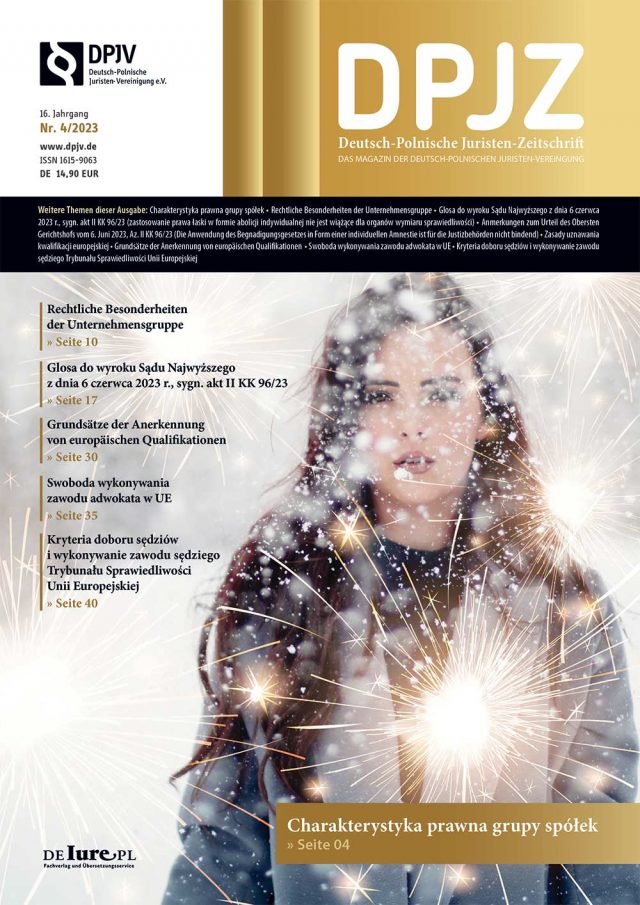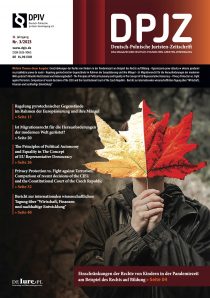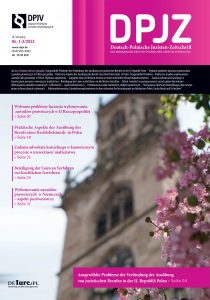Renata Wojtaszko
Charakterystyka prawna grupy spółek
Streszczenie: Niniejszy artykuł został poświęcony założeniom nowego prawa koncentracji gospodarczej, jaką są grupy spółek. Wyjaśniono w nim kluczowe pojęcia dla całej regulacji, określono zakres podmiotowy i podmiotowość grupy spółek. W dalszej części przedstawiono proces tworzenia formalnych zgrupowań, a także poruszono problematykę wpisu holdingu do rejestru przedsiębiorców.
Słowa kluczowe: grupa spółek, holding, spółka dominująca, spółka zależna
Abstract: This article is devoted to the assumptions of the new law of economic concentration, which is groups of companies. It explains the main terms for the whole regulation, defines the subjective scope and subjectivity of a group of companies. It delineates the process of creating formal groups and the issue of registering a holding company in the register of entrepreneurs.
Keywords: group of companies, holding, dominant company, subsidiary company
O autorce: Renata Wojtaszko – doktorantka w Szkole Doktorskiej KUL, aplikantka w Okręgowej Izbie Radców Prawnych w Lublinie, e-mail: wojtaszkorenata1@gmail.com.
Renata Wojtaszko
Rechtliche Besonderheiten der Unternehmensgruppe
Dr hab. Paweł Kuczma, prof. UZ, radca prawny
Glosa do wyroku Sądu Najwyższego z dnia 6 czerwca 2023 r., sygn. akt II KK 96/23 (zastosowanie prawa łaski w formie abolicji indywidualnej nie jest wiążące dla organów wymiaru sprawiedliwości)
Streszczenie: Tematyką głosowanego wyroku Sądu Najwyższego (II KK 96/23) jest zwrócenie uwagi na wątki konstytucyjnoprawne, które zostały podjęte przez Sąd Najwyższy na etapie rozpatrywania kasacji i które doprowadziły do uchylenia zaskarżonego wyroku Sądu Okręgowego. W głosowanym wyroku SN przeprowadził analizę prawa łaski pod kątem możliwości stosowania abolicji indywidualnej uznając, że abolicja indywidualna nie stanowi części składowej instytucji prawa łaski. Innymi słowy SN uznał, że stosowanie przez Prezydenta abolicji indywidualnej w ramach procedury ułaskawieniowej nie jest dopuszczalne prawnie.
Słowa kluczowe: Sąd Najwyższy, Prezydent, łaska, ułaskawienie, abolicja.
Abstract: The subject of the judgment of the Supreme Court (II KK 96/23) is to draw attention to the constitutional legal issues that were taken up by the Supreme Court at the stage of examining the cassation and which led to the reversal of the contested judgment of the Regional Court. In the judgment voted, the Supreme Court conducted an analysis of the pardon law in terms of the possibility of applying individual amnesty, recognizing that individual amnesty is not a component of the institution of the right of pardon. In other words, the Supreme Court held that the use of individual amnesty by the President as part of the pardon procedure is not legally permissible.
Keywords: Supreme Court, President, pardon, reprieve, abolition.
O autorze: Paweł Kuczma, Professor na Uniwersytecie Zielona Góra, ORCiD ID: 0000-0003-1443-4742, E-Mail: p.kuczma@wp.pl.
Paweł Kuczma
Anmerkungen zum Urteil des Obersten Gerichtshofs vom 6. Juni 2023, Az. II KK 96/23
Zusammenfassung: Gegenstand des Urteils des Obersten Gerichtshofs (II KK 96/23) ist es, auf die verfassungsrechtlichen Fragen aufmerksam zu machen, die der Oberste Gerichtshof bei der Prüfung der Kassation aufgegriffen hat und die zur Aufhebung des angefochtenen Urteils des Amtsgerichts geführt haben. In dem kommentierten Urteil analysierte der Oberste Gerichtshof das Begnadigungsrecht im Hinblick auf die Möglichkeit der Anwendung einer individuellen Amnestie und kam zu dem Schluss, dass eine individuelle Amnestie nicht ein Teil des Begnadigungsgesetzes ist. Mit anderen Worten der Oberste Gerichtshof stellte fest, dass die Inanspruchnahme einer individuellen Amnestie durch den Präsidenten im Rahmen des Begnadigungsverfahrens rechtlich nicht zulässig ist.
Schlüsselwörter: Oberster Gerichtshof, Präsident, Gnade, Begnadigung, Amnestie.
Über den Autor: Paweł Kuczma, Professor an der Universität Zielona Góra, Rechtsanwalt, ORCiD ID: 0000-0003-1443-4742, E-Mail: p.kuczma@wp.pl.
Julia Czerniak
Zasady uznawania kwalifikacji europejskiej
Uznawanie kwalifikacji europejskich to proces oceny i porównania kwalifikacji poszczególnych osób w Unii Europejskiej. Podstawą prawidłowego przebiegu tego procesu
są bez wątpienia zasady uznawania, których celem jest umożliwienie i ułatwienie dostępu
do nowych miejsc pracy oraz do systemów edukacyjnych i szkoleniowych w Europie. Jako rezultat badania analitycznego, zawartego w artykule – możliwe było wyszczególnienie rzeczywistych korzyści wynikających z posiadania kwalifikacji europejskich i ich uznawania na terenie Unii Europejskiej, oraz inkrementacja świadomości odbiorcy w zakresie zasad uznawania kwalifikacji zawodowych w Europie, wraz z ukazaniem poziomu rozwoju omawianego systemu w poszczególnych krajach członkowskich Unii Europejskiej.
Słowa kluczowe: europejski system uznawania kwalifikacji zawodowych, Dyrektywa Parlamentu Europejskiego i Komisji Europejskiej2005/36/WE.
O autorce: Julia Czerniak – seminarzystka seminarium prawa Unii Europejskiej na Katolickim Uniwersytecie Lubelskim; e-mail: juliaczerniak1905@gmail.com.
Summary: This essay deals with the principles of recognizing European qualifications. A very important element that was used when discussing particular issues is the Directive of the European Parliament and of the Council 2005/36/WE.
The essay was divided into three parts. The first one concerns the discussion of the concept of regulated professions based on the jurisprudence of the Court of Justice of the European Union. The second is an analysis of the list of regulated professions and what it includes. The third part of the essay is devoted to the discussion of the basic rules for the recognition of professional qualifications, various systems of their recognition, as well as a comparison between education and professional experience.
Keywords: European Recognizing professional qualification, Directive of the European Parliament and of the Council 2005/36/WE.
O autorce: Julia Czerniak – seminarzystka seminarium prawa Unii Europejskiej na Katolickim Uniwersytecie Lubelskim; e-mail: juliaczerniak1905@gmail.com.
Julia Czerniak
Grundsätze der Anerkennung von europäischen Qualifikationen
Zusammenfassung: Die Entwicklung der europäischen Integration und die Freizügigkeit der Arbeitnehmer verlangt nach gegenseitiger Anerkennung der beruflichen Qualifikation. Der erste Teil des Aufsatzes bespricht das Konzept der reglementierten Berufe auf der Grundlage der Rechtsprechung des Gerichtshofs der Europäischen Union. Der zweite Teil stellt eine Analyse der Liste der reglementierten Berufe dar. Der dritte Teil beinhaltet die Analyse der Grundprinzipien der Anerkennung von Berufsqualifikationen. Zur Erarbeitung des Themas wurden folgende Forschungsmethoden eingesetzt: Analyse von Rechtsquellen, Elemente der normativ-rechtlichen Methode und der vergleichenden Methode.
Schlüsselwörter: Europäische Anerkennung von Berufsqualifikationen, Richtlinie des Europäischen Parlaments und des Rates 2005/36/EG.
Über die Autorin: Julia Czerniak – Studentin an Katholischer Universität Lublin; E-Mail: juliaczerniak1905@gmail.com.
Klara Graboś
Swoboda wykonywania zawodu adwokata w UE
Streszczenie: Celem artykułu jest przybliżenie najistotniejszych zagadnień z problematyki zasad wykonywania zawodu adwokata w oparciu o Dyrektywę 98/5/WE Parlamentu Europejskiego i Rady z dnia 16 lutego 1998 r. mającą na celu ułatwienie stałego wykonywania zawodu prawnika w państwie członkowskim innym niż państwo uzyskania kwalifikacji zawodowych. W treści artykułu przedstawione zostało omówienie regulacji unijnych dotyczących uzyskania prawa do wykonywania zawodu prawniczego poza krajem, który nadal prawnikowi tytuł zawodowy, dozwolonych form wykonywania zawodu prawniczego, procedury integracji z prawnikami krajowymi oraz stosowania przepisów krajowych do prawników z Unii Europejskiej
Słowa kluczowe: zasady wykonywania zawodu adwokata, Dyrektywa 98/5/WE Parlamentu Europejskiego i Rady
Summary: The purpose of the article is to present the most important issues related to the practice of the profession of attorney based on Directive 98/5/EC of the European Parliament and of the Council of 16 February 1998 to facilitate practice of the profession of lawyer on a permanent basis in a Member State other than that in which the qualification was obtained. In the content of this article will be presented elaboration on Union regulation concerning the right to practice a legal profession outside the country, which given right to practice profession, the allowed form of practicing the legal profession, the procedure for dealing with a domestic lawyer and the application of national laws to lawyers from the European Union.
Key words: practice of the profession of attorney, Directive 98/5/EC of the European Parliament and of the Council of 16 February 1998.
O autorce: Klara Graboś – Seminarzystka seminarium Prawa Unii Europejskiej na Katolickim Uniwersytecie Lubelskim im. Jana Pawła II, e-mail: klara.grabos@gmail.com.
Kornelia Piasecka
Kryteria doboru sędziów i wykonywanie zawodu sędziego Trybunału Sprawiedliwości Unii Europejskiej
Streszczenie: Przedmiotowe opracowanie ma na celu przedstawienie podstawowych kryteriów doboru sędziów oraz kluczowe aspekty wykonywania zawodu sędziego Trybunału Sprawiedliwości Unii Europejskiej – wskazanie, jakie obowiązki wiążą się z tym stanowiskiem, ale także – jakie przywileje przysługują w związku z jego piastowaniem. Perspektywa ta ma uświadomić studentów prawa bądź adeptów tego kierunku o możliwościach związanych z rozwojem prawniczym na gruncie prawa Unii Europejskiej, co może przyczynić się do ukierunkowania ich kariery naukowej lub zawodowej, właśnie na tę płaszczyznę.
Słowa kluczowe: sędziowie Trybunału Unii Europejskiej, prawo Unii Europejskiej, perspektywy rozwoju kariery prawniczej.
Summary: This article is intended to present the basic criteria for the selection of judges and the key aspects of the profession of a judge of the Court of Justice of the European Union – to indicate what duties are associated with this position, but also – what privileges are available in connection with its tenure. This perspective is intended to make law students or adepts in this field aware of the opportunities associated with legal development on the grounds of European Union law, which may contribute to directing their academic or professional career, precisely to this plane.
Key words: judges of the Court of the European Union, European Union law, prospects for legal career.
O autorce: Kornelia Piasecka – studentka IV roku prawa stacjonarnego na Uniwersytecie Kardynała Stefana Wyszyńskiego w Warszawie. E-mail: k.piaseckka@gmail.com.



